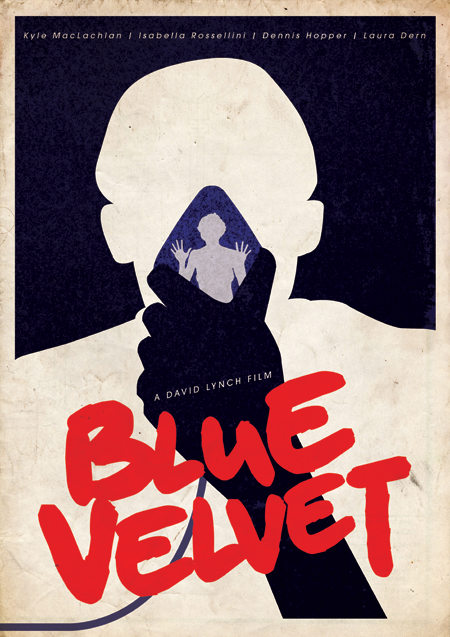Share This:
January 30, 2013 | Film,
David Lynch’s Blue Velvet and the Birth of the Term Lynchian
 It begins with a severed ear in a grassy field. It’s out of place, it’s a metaphor, it’s a plot point, it’s simultaneously creepy, funny and intriguing. In a word, it’s Lynchian.
It begins with a severed ear in a grassy field. It’s out of place, it’s a metaphor, it’s a plot point, it’s simultaneously creepy, funny and intriguing. In a word, it’s Lynchian.
There may be more successful, more universally lauded, more enjoyable David Lynch films in the oeuvre but Blue Velvet is the Lynch film. There are several ways one can make this argument but I’d like to concentrate on this one in particular: it firmly cemented the parameters of the term Lynchian, a term in which the director’s last name became not only a descriptor of the content of his films but also of certain unexpected, eerie moments of one’s life. Blue Velvet turned David Lynch’s last name into an adjective and this, in turn, has cleared the path for the rest of his career.
Though not written until ten years after the term began to enjoy usage in movie reviews, film school lectures, crossword puzzles and video store employee chit chat, David Foster Wallace penned the best definition of the somewhat nebulous descriptor in an essay about Lynch for Premiere Magazine. Wallace offered, “An academic definition of Lynchian might be that the term ‘refers to a particular kind of irony where the very macabre and the very mundane combine in such a way as to reveal the former’s perpetual containment within the latter.’ But like postmodern or pornographic, Lynchian is one of those Porter Stewart-type words that’s ultimately definable only ostensively-i.e., we know it when we see it.”
The strengthening of the definition of the term Lynchian was not limited to the content of his films, either. Movie critic Roger Ebert found this alarming confluence of disparate character traits when he interviewed Lynch shortly after panning the film in 1986. From Ebert’s review of Blue Velvet: “The movie is powerful, challenging and made with great skill, and yet it made me feel pity for the actors who worked in it and anger at the director for taking liberties with them. Then I interviewed Lynch in New York, and I found, not a monster, but a pleasant, sincere man who was disarmingly frank about his film.”
And so it began. David Lynch never again wavered from the arrangement he established during the making of Blue Velvet (less money for more control) and his vision and reputation has grown steadily over the last 25 years. In Lynch’s words, “I don’t think about technique. The ideas dictate everything. You have to be true to that or you’re dead.” Try finding a quote like that in the interview archives of any other filmmaker as well-known as Lynch. This is not the kind of strategy publicly spoken about by most successful filmmakers. You’ll hear about compromise, market research, wanting to delight an audience in a certain way, or simply acting as a hired gun for a paycheck.
While most artists struggle to merely wrestle an original vision on the page, screen, canvas, or stage, David Lynch managed to do so with such force that language itself had to be slightly tweaked to allow us to easily converse about it. Is there anything more gratifying an artist can experience? Forget flattery, make my name an adjective.
Blue Velvet will screen SAT, FEB 2 @ 9PM in the Bright Family Film Screening Room.
Ryan Walsh is the External Affairs Coordinator for ArtsEmerson




Leave a Reply